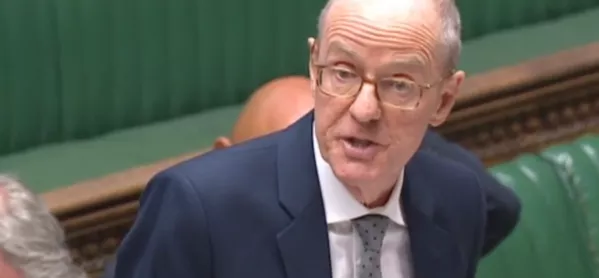Gibb: Ofqual grades model fair, good and ‘very popular’
Share
Gibb: Ofqual grades model fair, good and ‘very popular’
Schools minister Nick Gibb has said the model used to calculate this year’s A-level and GCSE grades was “fair” and “very popular”, but “something went wrong” with the way it was applied.
Mr Gibb also apologised to students for the “delays”, “uncertainty”, and “pain and anxiety” they will have faced following the chaos surrounding last week’s A-level results.
Appearing on BBC Radio 4‘s Today programme, the schools minister said “the model was a good model”, but “something went wrong” with the implementation process.
Exam boards: GCSEs will be on time
GCSEs 2020: More DfE ‘chaos’ over timing of results
U-turn: Centre assessed grades to be used for GCSEs and A levels
Asked how the model could be good when it has ended with “so much chaos in the system”, Mr Gibb said: “Because it’s the way the model was applied - the model is a description of the methods that we want to make this fair.
“The regulator then has to turn that into a mathematical model that the exams boards apply to the grades.
“And something went wrong at that stage - and that’s what will be examined by the select committee.”
He added: “What was always at the forefront of my mind was that no young person from a disadvantaged background would see their grades standardised to a greater extent than other young people.
“There was about a 2 per cent difference, that’s broadly what we saw in the national results last week, in contrast to what we saw in Scotland, where there was a big gap between disadvantaged pupils.
“And that’s because in this country we had more data about the prior attainment of young people that was built into the model.
“So the model itself was fair, it was very popular, it was widely consulted upon. The problem arose in the way in which the three phases of the application of that model - the historic data of the school, the prior attainment of the cohort of pupils at the school, and then the national standard correction - it’s that element of the application of the model that I think there is a concern.”
But he said it “certainly was foreseen” that private school pupils could benefit from the use of the algorithm.
“That certainly was foreseen because we knew that small cohorts had to rely more on the teacher-assessed grade than on the standardisation process, but that applied to the state sector as much as to the independent sector,” he said.
And Mr Gibb said he was warned about concerns that the algorithm used to determine grades could impact poorer pupils.
He was asked about reports in The Times which suggested Sir Jon Coles, a former director-general at the Department for Education, wrote to Mr Williamson early last month to express concerns about the algorithm used by Ofqual.
He said: “He [Sir John] spoke to me about it and he was concerned about the model and he was concerned that it would disadvantage particularly children from poorer backgrounds.
“And so I called a meeting therefore with the independent regulator, with Ofqual, to discuss in detail those very concerns.”
The schools minister also apologised to the “hundreds of thousands of young people” that are collecting either GCSE or revised A-level results today.
“I am sorry for the delays, the uncertainty, the pain and anxiety, that young people will have faced following what happened last week to the A-level grades,” he said.
Mr Gibb added that he will readily give evidence to the education select committee when it conducts an inquiry into events surrounding the grading chaos.
“The education select committee will be holding an inquiry and I welcome the opportunity to give evidence to that committee,” he said.




